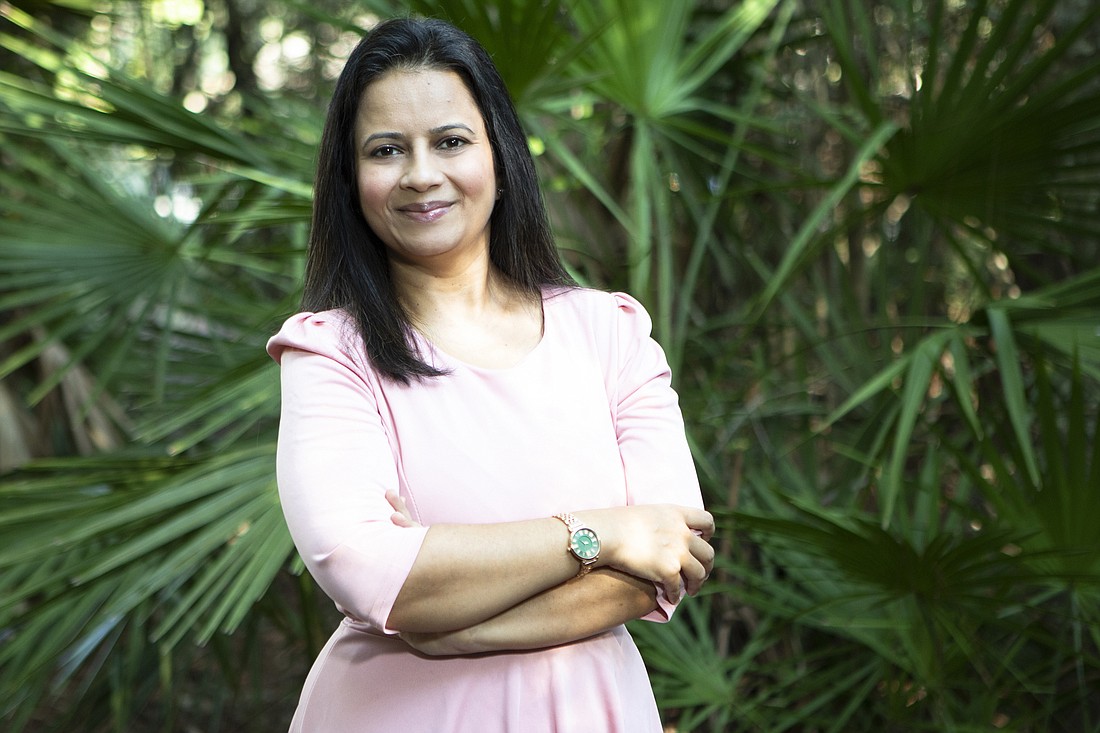- July 26, 2024
-
-
Loading

Loading

Last year, Resha Shroff, CEO and co-founder of Lynx Automation, began looking for a place to relocate her California-based software company.
Lynx Automation develops technology for automated property management for hotels, motels, vacation and long-term rental properties. Its software links devices and sensors, which in turn control digital locks, thermostats and more.
But the tech-savvy Golden State was not the ideal place for Lynx Automation to stay, company leaders decided, mostly because of California's tax and regulatory environment.
Lynx Automation becomes the latest California tech company to leave the Golden State in search of lower taxes and costs, fewer regulations and a healthier bottom line — specifically in Tampa Bay.
It joins other such companies like AutoSlide, which moved earlier this year, and OPSWAT, which came in early 2022. The trend indicates Tampa Bay, in some cases, is beating out other tech-savvy southern cities such as Nashville and Austin.
Shroff and Lynx executives looked at Nevada, Tennessee and Texas. But they also zeroed in on Tampa Bay, a place they were already familiar with because their business deals mainly with hotels, motels, vacation-home owners and AirBnB operators.
The spots in the other three states were landlocked. In that respect, Nevada, Tennessee and Texas didn't stand a chance. Lynx Automation was already landlocked in the Sacramento, region, where executives thought being close to Silicon Valley and the San Francisco's Bay Area would benefit them. ("It didn't turn out that way," Shroff says.)
Now Shroff and her fellow executives were scouting a business-friendly area with beaches, rivers, bays and hotels — lots of hotels. It struck Shroff as unique.

"There's a lot of buzz around Tampa," says Shroff. "It was on the map ... There's a lot of migration trend that is happening that definitely caught our attention."
And Shroff and her fellow executives often had to visit Florida as part of their business.
Looking at Tampa Bay, Shroff says the different natures of Pinellas and Hillsborough counties worked in the region's favor, offering employees many different lifestyles and choices, from the beach-centric style of St. Pete Beach to the restaurant and shopping culture of South Tampa.
Lynx announced in early September it would be moving to one of the two counties, although Shroff says the company has not decided yet on an exact location. Lynx Automation can take its time, for now, as its workforce is mostly remote.
But the hiring of the next 50 employees Lynx Automation wants to add has started. The company already employs 54 people in Canada, India and the United States, and recently hired its first Tampa Bay employee. The Tampa Bay jobs will include customer support; customer account managers; salespersons; and back-end IT engineers.
The announcement seemed like a rare time two closely-linked economic development agencies — St. Petersburg Area Economic Development Corp. and Tampa Bay Economic Development Council — worked together to lure a company into Tampa Bay. It has happened before, EDC officials say, because the regional EDCs want the benefit of new business in the metropolitan area.
Such close cooperation usually arises when a company has focused on "Tampa Bay," rather than a particular county, says Anne Core, St. Pete EDC vice president of marketing and communications. And if a company needs particular space that Pinellas County cannot provide, St. Pete EDC recommends Tampa.
After all, it's the Tampa-St. Pete metro region, with Core adding "we would rather have someone come to the region than not come to the region."
"We regularly coordinate with our partners and colleagues in Pasco, Pinellas and surrounding counties to provide overviews and site visits of our respective communities," says Craig Richard, Tampa Bay EDC president and CEO, in an email to the Business Observer. "No matter where a company ultimately decides to locate within our region, it's a win for us all."
Of course, both organizations, like in other two-county pockets of the region, have separate boards, with separate funding and separate accountability levers. It's a big reason why traditionally, while economic development consultants preach regionalism, individual entities are on the hunt for a clear win.
With Lynx Automation, the two EDCs had a powerful third ally that has been at work for more than a decade: the state's low-tax, light regulatory environment. Florida has been busy for more than a decade competing with Texas and Tennessee, two Southern states with no income tax, to attract businesses leaving New York and the Northeast, the Midwest and California, mostly because of taxes and regulations.
In the last few years, the pandemic noticeably accelerated the trend toward Florida from New York. And California is still bleeding jobs into the Southeast and Southwest, and has been for years. Recent regulatory and tax legislation in the Golden State seems to have only pushed businesses harder to make a decision: stay or leave.
California, where Lynx Automation moved to in 2019 from Illinois, wasn't all bad. Shroff notes property taxes are a little bit lower in California, which surprised the search team.
"But when you talk about business tax, that's where the benefits are," says Shroff. "And then obviously, the income taxes for an individual. That's also beneficial to Florida."
Florida has a 5.5% corporate income tax, according to the Tax Foundation. And the Florida Constitution forbids a tax on personal income. (Florida is one of only seven states with no personal income tax.)
In comparison, California's state income tax for businesses is as high as 8.84%. Its progressive individual income tax is the highest in the nation, at 13.3% for the wealthiest earners. Those higher rates could have caught up with Lynx Automation, as its growth is considerable.
While Shroff declined to share revenue figures, she pointed to Inc. magazine naming Lynx Automation as one of fastest-growing private companies in 2022. As part of the Inc. 5000 for 2022, Lynx Automation placed at No. 1,237.
Lynx Automation operates in 350 cities in six nations. Its software can integrate with devices, such as Yale digital locks, almost anywhere in the world, Shroff says.
"That's the beauty of a software business," says Shroff. "It's very scalable."
In California, it turns out taxes are scalable, too. That, in turn, leads to a volatile business environment.
"Every time business leaders peer around the corner, they see another tax coming," says Jared Walczak, vice president of state projects for the Washington, D.C.-based Tax Foundation, of California. "California is always threatening the next tax."
The regulatory environment, too, is becoming more cumbersome, Walczak says.
When Lynx Automation explained their dilemma to the EDCs, Florida economic development officials were ready to make a strong case.
"We've seen a steady increase in interest from California companies over the last several years, particularly in the technology space," says Richard of Tampa Bay EDC. "Tampa's lower business costs and taxes are attractive to companies, and we offer a friendlier, more collaborative business environment."
But Tampa Bay is no Silicon Valley. And tech-heavy cities like Austin, Texas, and now even Salt Lake City, Utah, have been competing with Florida for California's tech businesses.
Despite tech workers being scattered to Florida's west, the pandemic helped Florida's business environment. It created more remote work, and it's now possible to convince businesses that Tampa Bay's growing tech sector has the right people at the right price for the headquarters. Plus, a company can always hire remote workers from anywhere in the world.
Walczak says this trend makes it much easier for tech businesses to peer outside of Silicon Valley for corporate relocation.
"For tech, more than any other industry, remote changes everything," says Walczak. "It's no longer just one or two (tech) cities."
Shroff says Lynx Automation wants the headquarters to have a goodly portion of its employees working there, so the lifestyle of Tampa Bay, as well as the tax environment, was important to attract top workers.
And the final sales point for Tampa Bay?
"The sunshine," says Shroff.
That's likely not surprising to Richard.
"As quality of life has taken on greater importance over the last few years, talent has flocked to the Tampa Bay area and companies have followed," says Richard.